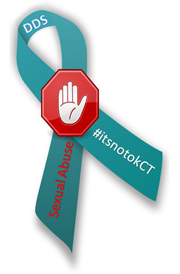itsnotokCT Resources
 Individual Resources: Are you a victim of sexual assault or abuse? Here are some resources to find help.
Individual Resources: Are you a victim of sexual assault or abuse? Here are some resources to find help.Sexual Violence Crisis Connecticut 24-hour Hotline: All direct services through our member centers are free and confidential. Call our statewide 24/7 toll-free hotlines to speak with a certified sexual assault crisis counselor. Telephone: (888) 999-5545 (English), (888) 568-8332 (Spanish).
Email: info@endsexualviolencect.org
Website: http://endsexualviolencect.org/
National Resource: https://www.rainn.org/about-national-sexual-assault-telephone-hotline
Survivor Resources: Looking to connect with other survivors or for resources to prevent yourself from becoming a victim? Here are a few links that you might find helpful.
“Survivor,” an easy-to-read guide developed by Nora Baladerian, PhD, founder of the Disability without Abuse project. https://norabaladerian.com/survivor-a-sexual-assault-guidebook-for-victims-with-developmental-disabilities/
The Rules of Sex For Those Who’ve Never Been Told: https://norabaladerian.com/the-rules-of-sex-for-those-who-have-never-been-told/
A Picture Guide to the medical; Exam After Sexual Assault: https://centralmnsac.files.wordpress.com/2019/04/picture-guide-to-the-medical-exam-after-the-sexual-assault.pdf
Family Resources: Do you want to learn how you can empower your loved one to prevent them from becoming a victim? Do you have a family member with an intellectual disability who was sexually abused? Here are some resources for you.
Secondary Survivors/Concerned Persons https://cmsac.org/education-safety-reporting/concerned-persons/
Staff and Organizational Resources: As a staff person supporting people with intellectual disabilities, you are required to report any form of abuse, including sexual abuse. Here are some resources that can help.
Sexual Assault Response Teams (SART)
Sexual Assault Response Teams (SARTs) help survivors through the maze of community services available to them and uses the experiences of survivors to improve those services. The National SART Discussion Group promotes ongoing dialogue and information sharing among community and professional organizations/agencies that respond to sexual violence.
SART Toolkit: Sexual Assault Response Team (SART) Toolkit
Sexual Assault Response Teams (SARTs) help survivors through the maze of community services available to them and uses the experiences of survivors to improve those services. The National SART Discussion Group promotes ongoing dialogue and information sharing among community and professional organizations/agencies that respond to sexual violence.
SART Toolkit: Sexual Assault Response Team (SART) Toolkit
Healing the Trauma http://dhhr.wv.gov/bhhf/Documents/2013%20IBHC%20Presentations/Day%203%20Workshops/Healing%20the%20Trauma.pdf
Tools to measure your organization’s capacity to support survivors with disabilities: https://www.endabusepwd.org/publications/performance-indicators/
Resources for Law Enforcement: The role of law enforcement is to protect and serve. Learn how you can help people with disabilities who have been the victim of sexual violence.

